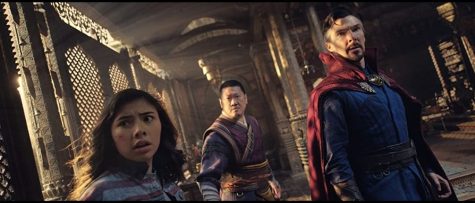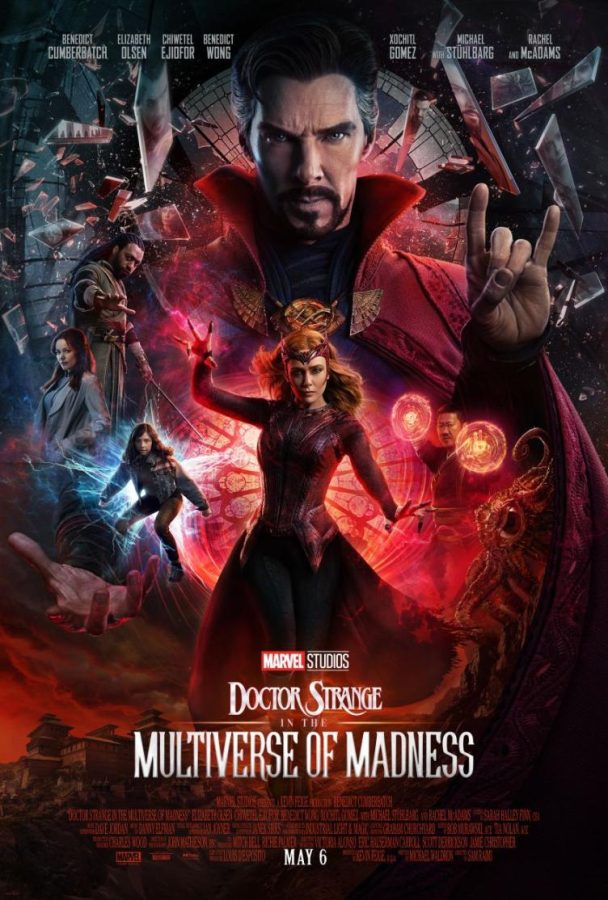“Doctor Strange in the Multiverse of Madness” is a Maddeningly Good Time
“Doctor Strange in the Multiverse of Madness” is the 11th project in Marvel Studios’ 4th Phase of projects.
May 11, 2022
This article may contain mild spoilers for “Multiverse of Madness” and other Marvel productions from the past year or two.
On May 6th, 2022, Doctor Strange in the Multiverse of Madness, the latest production by Marvel Studios, hit theaters to much anticipation by fans. This comes after an approximate six week delay from its original release date of March 25th, along with other Marvel projects shifting by a similar margin. The reasons for these delays are contested, ranging from problems with the time slots to allowing for more time for overworked employees to finish the projects.
Regardless of the reasons why, Multiverse of Madness is finally here after its announcement in July of 2019, and it is a very delightful installment in the ever expanding Marvel Universe, involving not only breaking open the Multiverse, but also the Marvel mold.
Set immediately after the events of Spider-Man: No Way Home, Multiverse of Madness continues the storyline this entire phase of the Marvel Cinematic Universe (MCU) has been building to: the introduction and exploration of the Multiverse, hence the title of the movie. Scientifically speaking, the Multiverse Theory is the idea that the universe we live in is just one of infinite universes that are parallel with each other. The thought experiment of Schrödinger’s cat is often connected to this theory.
In Marvel, the Multiverse operates under similar logic. There are several different universes that are under the Marvel domain that live parallel to each other. For example, the universe the original comics takes place in is a different universe than that of the movies and TV shows.

Spider-Man: No Way Home brought the Multiverse to the prime timeline the MCU takes place in. Multiverse of Madness brings the prime timeline to the multiverse itself with Doctor Stephen Strange (Benedict Cumberbatch) needing to protect America Chavez (Xochitl Gomez), a young woman with the ability to travel through the Multiverse, from Wanda Maximoff (Elizabeth Olsen), also known as the Scarlet Witch, who seeks to take America’s power to find her children in the Multiverse as was established by the Disney+ series WandaVision in early 2021.
An absolutely bonkers movie such as this one needs an appropriately unconventional director to helm it. After the original director, Scott Derrickson, left the project due to creative differences, acclaimed director Sam Raimi, the director of the original trilogy of Spider-Man movies starring Tobey Maguire, stepped in. With his return to the superhero genre, Raimi also pulled from his background of horror directing (a la the Evil Dead franchise) to provide a truly unique experience. The changing of the guard also meant a new screenwriter in the form of Michael Waldron, the head writer on a different Marvel project dealing with the creation of the Multiverse, the Disney+ series Loki. The influences of both of their styles can be felt in the movie to both subtle and not-so-subtle degrees.
The response to the film has been somewhat mixed after opening weekend. The ratings are relatively good; however, some people have voiced complaints such as the movie being a little too different from the Marvel mold or it being a bit convoluted at times.
These statements do have a little bit of candor to them, but that doesn’t necessarily mean it’s entirely a bad thing. Breaking molds and barriers is important because otherwise plots get exhaustive. The radical new formula benefits the film overall because of how the Multiverse is in reality: different and unknown. This connects with the slight messiness of the plot seeing as how the characters are just as confused at the situation as we are. Sometimes just the thrill of the unknown and new possibilities can only be shown through slight convolution.
One critique that holds a little more water, however, is that for the film being called Multiverse of Madness, there wasn’t as much madness in the Multiverse as had been set up. The foundation of the Multiverse itself isn’t being shaken, and it’s more of a chase primarily through one or two new universes that doesn’t really amount to much. At least not as of yet. There is definitely room for serious repercussions after the events of the film that could potentially lead somewhere. However, as of yet, it’s very much up to the interpretation of the viewer where this story can go in the future.

However, again, that’s not the worst thing in the world.
Audience interpretation means a possible spark for creativity, a chance to really think. Anything is possible with a Multiverse, and not only does that mean Marvel Studios has a chance to tell an infinite amount of incredible stories now, but common viewers can as well.
Ultimately, Multiverse of Madness is a fun film in its own right that holds up better than some other Marvel titles with a solid 4.5/5 stars, but what the film itself is saying is more important than what was seen on screen. The possibilities are endless… and Marvel is just getting started.
It’s unclear in what universe the next film, Thor: Love and Thunder, takes place in, but whether it’s close to home or a million universes away from what’s familiar, it’s surely going to be a wacky ride and another worthy triumph for the studio.



